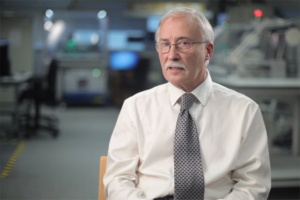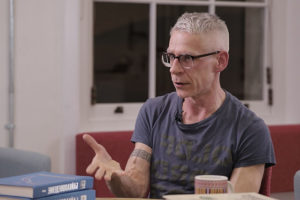Metabolic Phenotyping in Health and Disease
Biochemist Ian Wilson on the interaction between genotype and phenotype, prediction of metabolic disease, and ...
One of the areas I carry out research in and one of the focuses of my research laboratory is the idea of cognitive variability. For me variability comes in many different forms: you can see how we seem to get cleverer as we get older, what we can do as children but not as young babies, what we can do as teenagers but not as young children, so there’s a change in our cognitive abilities over age. But also take children of a given age, six-year-olds, you may find that some six-year-olds are more able than other six-year-olds. There’s variation even within an age. You can find extremes, you can find developmental disorders, you can find giftedness. And there’s variation at the end of our lives as aging sets in. For me it’s important to link together all these forms of variability, because I think common mechanisms can underpin them all.
Now when you do that, you begin to get some important insights about where psychology is as a field at the moment. I think, one of the problems in psychology is – it’s been set up around certain kinds of disciplines, certain kinds of divisions. And it’s a sensible idea, we can’t study everything at once, we’ll split it into separate problems and will have separate groups of researchers study each of their problems. So within psychology we might have one group of individuals studying development, trying to find how children get better, get cleverer, as they get older. What they’re interested in is characterizing the development of the average child. And then another group says: well, we’re interested in differences between people, individual differences in intelligence. We’re not going to look at differences across age, we’re just going to take a cross-section, at all children of this age, and will look at differences. And then another group says: well, we study disorders.
I think, it’s a problem when you study these things individually. It’s like taking a 100m race. You might have separate people trying to say, well, we’re trying to work out how the runners get from the beginning to the end by averaging together all of the individuals, we’ll just have an average runner. A separate group of individuals will say: we’re trying to understand the causes of who’s in the lead and who’s behind at a given point in the race. I think, this causes problems in separating between those different divisions of labor, as it were, because ultimately, as I indicated, what you have is a set of individuals undergoing a process of development. And that process of development is constrained or influenced both by genetic influences in environmental influences. And what one needs to understand first is the process of development as it applies to all of us, and then the factors that modulate the process of development.
So let me narrow that down to something concrete: take intelligence and our cognitive abilities, and how we think. You might hear that those are highly heritable, that genes are very important in deciding how clever we are and what kind of skills we can do. And you might think from that that somehow genes are limiting us in what we’re able to do. But those genetic effects are just about the differences between people.
So let’s go back 50 years ago. No one knew how to use a smartphone, no one knew how to use a tablet, no one had that skill. 50 years later most of us can use smartphones and tablets. Our brains are different. The human brain now has structures for swiping left and swiping right. It’s a completely different skill that we as a species acquired. And all of this genetics of intelligence – that might make us think we are constrained in what we’ve learned. But think again, here is a population, and you might find that some individuals are a little bit better at using smartphones, some individuals are a little bit worse at using smartphones. Maybe the differences between them, between how clumsy you are at typing text messages, maybe some of those differences are coming from genetics. But all of that is separate to the fact that over a generation we as a species have acquired a completely different skill. I think, it’s very important to try and think about a mechanistic basis, how you can integrate processes that affect us all as a species, that don’t much vary between us, with the kind of lesser differences you see between members of the species.
The further steps of taking this approach forward are to try and remove the barriers between these disciplines. In fact, you could be more radical than that with current interdisciplinary approaches, you could reorganize universities around researchers to solve problems, rather than having them in separate disciplines and then trying to get different researchers to work together.
In this case, within psychology the problem is coming in splitting between different forms of cognitive variability. What we need to do is to take a more mechanistic basis to think about causal mechanisms, to understand lifespan development and the processes that produce, that underpin biological development, cognitive development across the lifespan. Once we have that basic account, then we can think about how genetic influences or environmental influences modulate the trajectory of development. Whereas if we don’t have a fundamental platform or foundation in understanding how development works for everyone, it’s almost a distraction to look purely at the causes of variation.

Biochemist Ian Wilson on the interaction between genotype and phenotype, prediction of metabolic disease, and ...

Geographer Anson Mackay on freshwater pollution, acid rains and the dangers of invasive species and algal bloo...

Hippocampal place cells, which create an internal map during novel exploration, are getting ‘replayed’ during...